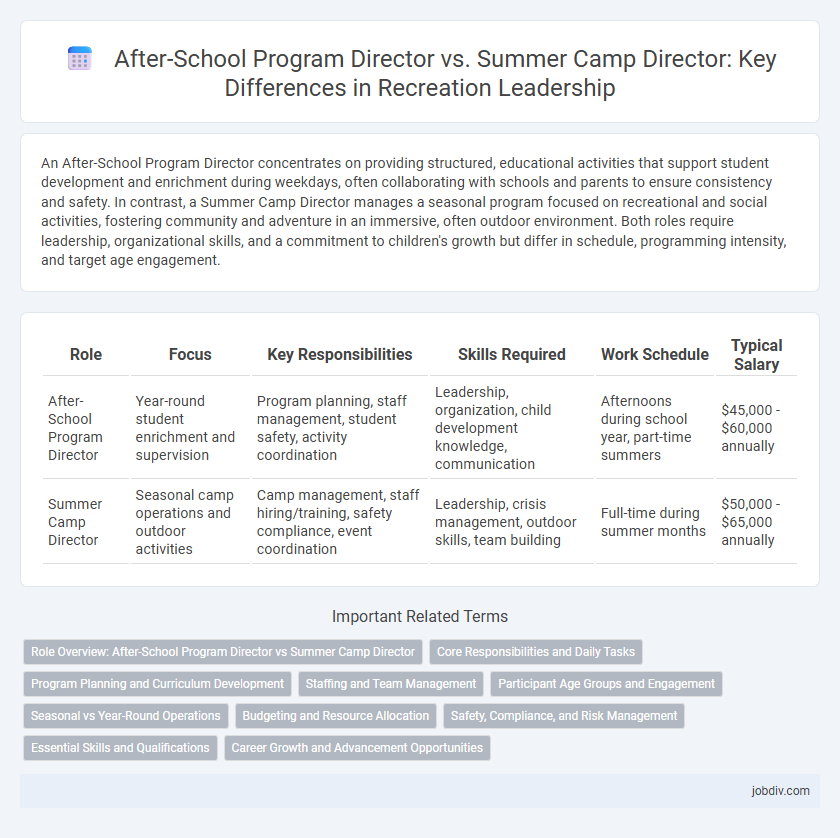An After-School Program Director concentrates on providing structured, educational activities that support student development and enrichment during weekdays, often collaborating with schools and parents to ensure consistency and safety. In contrast, a Summer Camp Director manages a seasonal program focused on recreational and social activities, fostering community and adventure in an immersive, often outdoor environment. Both roles require leadership, organizational skills, and a commitment to children's growth but differ in schedule, programming intensity, and target age engagement.
Table of Comparison
| Role | Focus | Key Responsibilities | Skills Required | Work Schedule | Typical Salary |
|---|---|---|---|---|---|
| After-School Program Director | Year-round student enrichment and supervision | Program planning, staff management, student safety, activity coordination | Leadership, organization, child development knowledge, communication | Afternoons during school year, part-time summers | $45,000 - $60,000 annually |
| Summer Camp Director | Seasonal camp operations and outdoor activities | Camp management, staff hiring/training, safety compliance, event coordination | Leadership, crisis management, outdoor skills, team building | Full-time during summer months | $50,000 - $65,000 annually |
Role Overview: After-School Program Director vs Summer Camp Director
The After-School Program Director manages structured activities, enrichment classes, and safety protocols for students during after-school hours, emphasizing academic support and social development. The Summer Camp Director oversees recreational programs, staff coordination, and outdoor activities during summer months, focusing on team building and camper engagement. Both roles require strong leadership, program planning, and adherence to regulatory standards within their respective seasonal frameworks.
Core Responsibilities and Daily Tasks
After-School Program Directors manage educational activities, supervise staff, and ensure a safe environment for students during after-school hours, focusing on curriculum planning and behavioral management. Summer Camp Directors oversee daily camp operations, coordinate recreational activities, manage counselors, and handle logistics such as scheduling and safety compliance in outdoor or specialized settings. Both roles require strong leadership, program development, and participant engagement skills, but after-school programs emphasize academic enrichment while summer camps prioritize recreation and social interaction.
Program Planning and Curriculum Development
After-School Program Directors concentrate on developing structured, skill-building curricula that align with educational standards and support students' academic and social growth during the school year. Summer Camp Directors prioritize creating flexible, engaging activities that foster teamwork, creativity, and outdoor skills, often incorporating thematic events and recreational learning experiences. Both roles require strategic program planning but differ in focus: academic enrichment versus recreational development.
Staffing and Team Management
After-School Program Directors typically manage smaller teams focused on daily student engagement, requiring skills in scheduling staff shifts and ensuring compliance with child safety regulations. Summer Camp Directors oversee larger, seasonal teams, emphasizing staff recruitment, intensive training, and coordination of diverse activities across extended hours. Both roles demand strong leadership and conflict resolution abilities to maintain a cohesive, motivated team environment.
Participant Age Groups and Engagement
After-School Program Directors typically manage activities for school-aged children ranging from 5 to 12 years old, emphasizing educational support and skill development during weekdays. Summer Camp Directors oversee a broader age range from 6 to 16 years, focusing on recreational, social, and leadership activities designed for extended engagement during summer breaks. Both roles require tailoring programs to participant age groups to maximize engagement and developmental benefits.
Seasonal vs Year-Round Operations
After-School Program Directors typically manage year-round operations, coordinating daily activities and curricula that align with the school calendar, while Summer Camp Directors focus on seasonal programs, overseeing short-term, intensive recreational experiences during the summer months. Year-round After-School programs require continuous planning, staffing, and compliance with educational standards, whereas Summer Camp Directors prioritize creating immersive, themed outdoor activities and managing temporary staff for a condensed timeframe. Understanding these operational distinctions helps in tailoring leadership strategies to meet the unique demands of each role within the recreation sector.
Budgeting and Resource Allocation
After-School Program Directors prioritize budgeting for year-round educational materials, staff salaries, and facility maintenance, ensuring resources support consistent student engagement and safety. Summer Camp Directors allocate funds primarily toward seasonal staff, specialized activity equipment, and temporary accommodations, with a focus on maximizing participant experience during limited camp sessions. Both roles require strategic resource allocation but differ in timing and type of expenditures based on program duration and objectives.
Safety, Compliance, and Risk Management
After-School Program Directors and Summer Camp Directors both prioritize safety, compliance, and risk management, ensuring all activities meet state regulations and licensing requirements to protect participants. After-School Program Directors focus on maintaining a secure environment during shorter, daily sessions, emphasizing protocols for student pickup and drop-off, while Summer Camp Directors manage extended overnight or day camps, addressing broader risks such as outdoor hazards and emergency response planning. Both roles require thorough staff training in first aid, supervision standards, and incident reporting to minimize risks and uphold program integrity.
Essential Skills and Qualifications
After-School Program Directors must excel in curriculum planning, student engagement, and behavior management, often requiring a background in education or social work alongside strong organizational skills. Summer Camp Directors prioritize leadership in outdoor activities, safety protocols, and staff coordination, typically needing certifications in CPR, first aid, and experience in recreational programming. Both roles demand excellent communication, problem-solving abilities, and a passion for youth development to create enriching environments.
Career Growth and Advancement Opportunities
After-School Program Directors often experience steady career growth through opportunities in educational institutions and community organizations, advancing into roles such as district coordinators or program developers, leveraging their expertise in child development and curriculum planning. Summer Camp Directors gain advancement by expanding into specialty camp management or regional director positions, benefiting from skills in seasonal program coordination and staff leadership. Both roles offer unique pathways to senior management in recreation departments, nonprofit organizations, or youth services agencies, emphasizing leadership, program innovation, and strategic planning.
After-School Program Director vs Summer Camp Director Infographic

 jobdiv.com
jobdiv.com